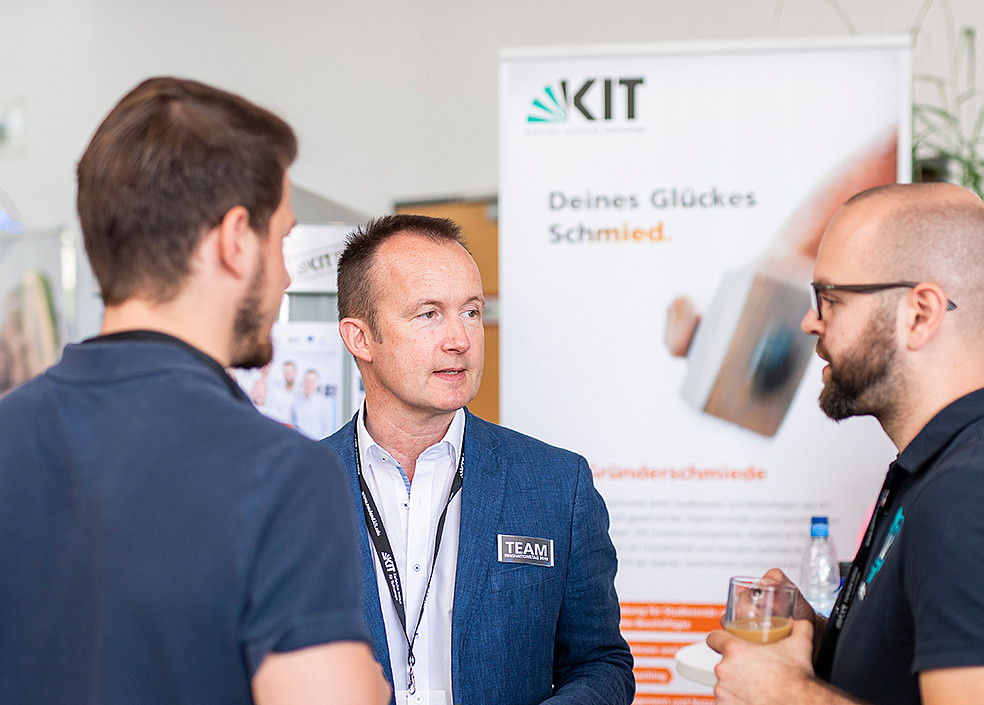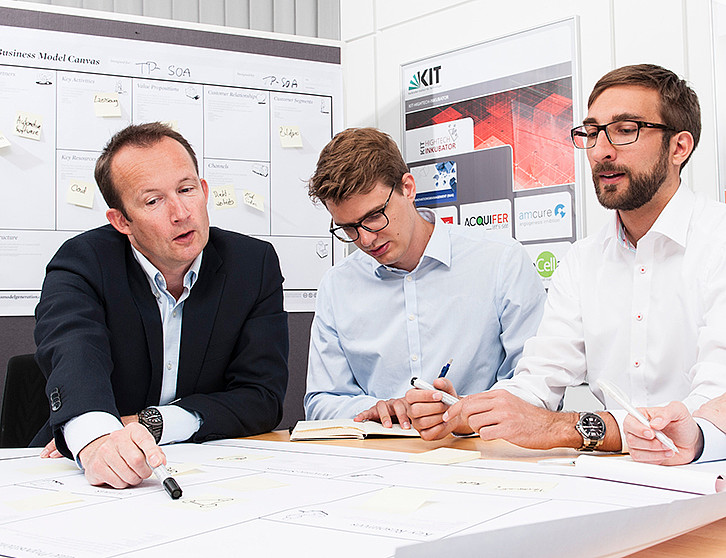Published on May 20, 2021
Professions in technology transfer: Start-up Consulting
For some weeks now, we have been shedding light on the various professional fields of technology transfer at KIT. Including, the management of a transfer unit, the innovation management as well as the patent and license department. In addition to the transfer of research results to established companies in the free economy, technology transfer via scientific spin-offs is another focus at KIT. To promote this path, KIT has a specialized team of start-up advisors. Dr. Rolf Blattner has been a founder advisor at KIT for many years within the framework of KIT-Gründerschmiede and explains in the interview his passion for this special field and why his profession is so important for the transfer between university and society.

How to become a Start-up Consultant or Business Development Manager?
Rolf Blattner: The path to becoming a business development manager usually leads via a degree, often in the field of natural sciences or engineering. After initial work experience in business at the interface between research and development departments or even product development, sooner or later one comes into contact with customers and their requirements. The proximity to innovative fields of work in one's own environment also facilitates the leap into business development.
Especially at an institution like KIT, with its very large research spectrum, there are excellent opportunities to further develop new, innovative product or service ideas and to bring them to market maturity. The way to a start-up consultant, a special form of business development manager, is actually not that far then, since the young company founders also have to deal with exactly these areas – research and development, marketing, and sales. We support them in this with our many years of experience.
How did you get into this profession?
Rolf Blattner: My own path into business development actually began after my doctorate in the classic technology transfer of the former Karlsruhe Research Center, today's Campus North of the KIT, directly at the interface between research and industry. The aim was to establish cooperations between industrial partners and research institutes with the aim of jointly developing mature products and launching them on the market. In development cooperations, license agreements are then concluded between the industrial partners and the research institute or university. I also spent two years at KIT working in the licensing department, associated with the negotiation of licensing conditions and the subsequent drafting of licensing agreements.
„Accompanying and supporting the teams on their way to setting up a company, and then finally celebrating the successes together with them, is what makes my daily work so interesting and varied.“
Dr. Rolf Blattner
Why did you choose a career in Technology Transfer?
Rolf Blattner: The functional areas of marketing and sales in companies have always been very exciting for me, as this is where decisions are made as to whether and how a company's offerings are accepted by the market. As a trained mechanical engineer, however, I still feel very much at home in the areas of research and (product) development. The decision to pursue a career in technology transfer at KIT came about as a result of a specific job offer from the then "Technology Transfer and Marketing" department of the Karlsruhe Research Center. I was given the chance to take over the tasks of the sales department of an institute – directly at the interface between the scientists of the institute and the company representatives as customers. This marked the beginning of my path into business development in 2000.

What are the requirements of the job as a Start-up Consultant? What skills should you have?
Rolf Blattner: A degree in natural sciences or engineering is certainly helpful, but not absolutely necessary. What is more important is the joy of getting involved again and again, sometimes very intensively, with new people and their business ideas. Therefore, strong communication skills, analytical thinking skills and a sense for entrepreneurial mindsets are certainly the most important qualities to bring along. Knowledge of foreign languages and intercultural skills are still very important, especially in our international research environment. Along with this, you should be able to work in a team as a start-up consultant, since you will be working a lot and closely with people. Organizational talent rounds off the profile.
What does a typical day look like for you? What does your job involve exactly?
Rolf Blattner: My main task is to help teams who want to start a company to finance their venture. This is done at a very early stage of starting a business from a research institution or university, often through funding from the government. Therefore, my workday usually consists of consulting meetings with new and existing teams that want to apply for funding. I support the teams from the initial idea through business model development to the preparation of application documents for the calls for proposals, as well as in the preparation of presentations for the jury meetings. If the funding project applications are approved and the teams can start working on their business ideas, then I support them by monitoring and project managing the ongoing funding projects until project completion – but usually well beyond that, so that contact remains. We keep an eye on the teams and enjoy their development steps and successes.
Why does KIT need a Business Development Manager or Start-up Consultant?
Rolf Blattner: KIT has about 5,000 professors and scientists and about 23,000 students – in other words, a very large potential! One way to use this potential on the KIT side is to found a company based on scientific results. For example, KIT has filed patents for 40 inventions in 2019 and 50 in 2020 alone, which can be used to create innovative products. On the other hand, there is a very great support offer for company founders in Germany that can be used by us. The team of start-up advisors at the interface is there to ensure that the greatest possible benefit can be derived from this unique initial situation – that is, the transfer of scientific results from KIT to society via start-ups.
What do you like about your job?
Rolf Blattner: The best thing about my job is the intensive collaboration with the young, very motivated and diverse people in the teams as well as the professors who are involved as their mentors at the institutes. It is always interesting to see how the aspiring company founders interact with each other as a team in order to become successful. But also the product or service ideas that the teams develop from their research work at the KIT institutes as well as the joint elaboration of their business models with them are a new and exciting challenge for me every time.
The interview was conducted by Marie Simon.

comments about this article
No comments